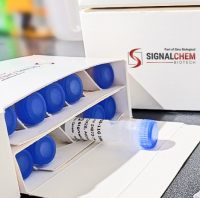Molecular Detection of Smad2/Smad4 Alterations in Colorectal Tumors
互联网
629
The signaling pathways mediated by the transforming growth factor-β (TGF-β) family of factors are implicated in a wide array of biological processes including cell differentiation and proliferation, determination of cell fate during embryogenesis, cell adhesion and cell death. The recent discovery of the SMAD family of signal transducer proteins as mediators of TGF-β relaying signals from cell membrane to nucleus has revolutionized the understanding of the molecular basis of these processes (1 ,2 ). To date, at least eight homologues of the Smad genes have been identified and shown to be downstream of the serine/threonine kinase receptors Table 1 ). SMADs are molecules of relative mass 42K-60K composed of two regions of homology at the amino and carboxy terminals of the protein. The activation of SMADs by receptors upon TGF-β binding results in the formation of hetero-oligomeric complexes and translocation to the nucleus where transcription of target genes is effected. However, some of the SMADs apparently inhibit rather than mediate, TGF-β signaling. These inhibitory SMADs are also induced by TGF-β stimulation suggesting that there is an intracellular negative-feedback loop.








